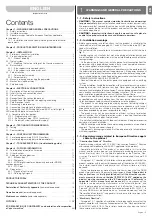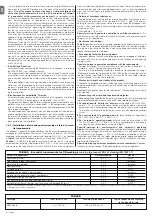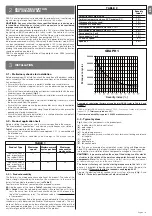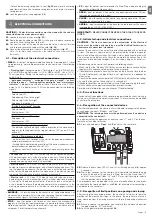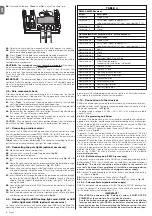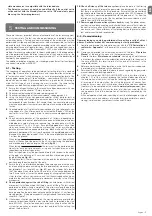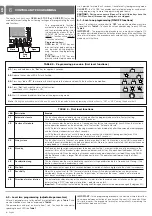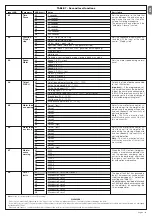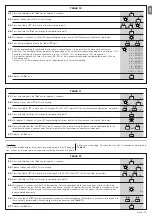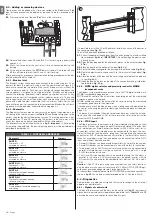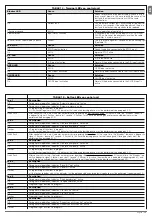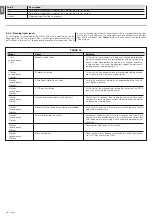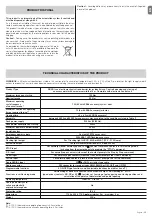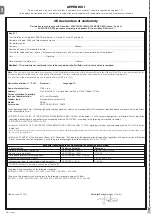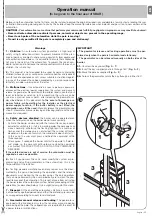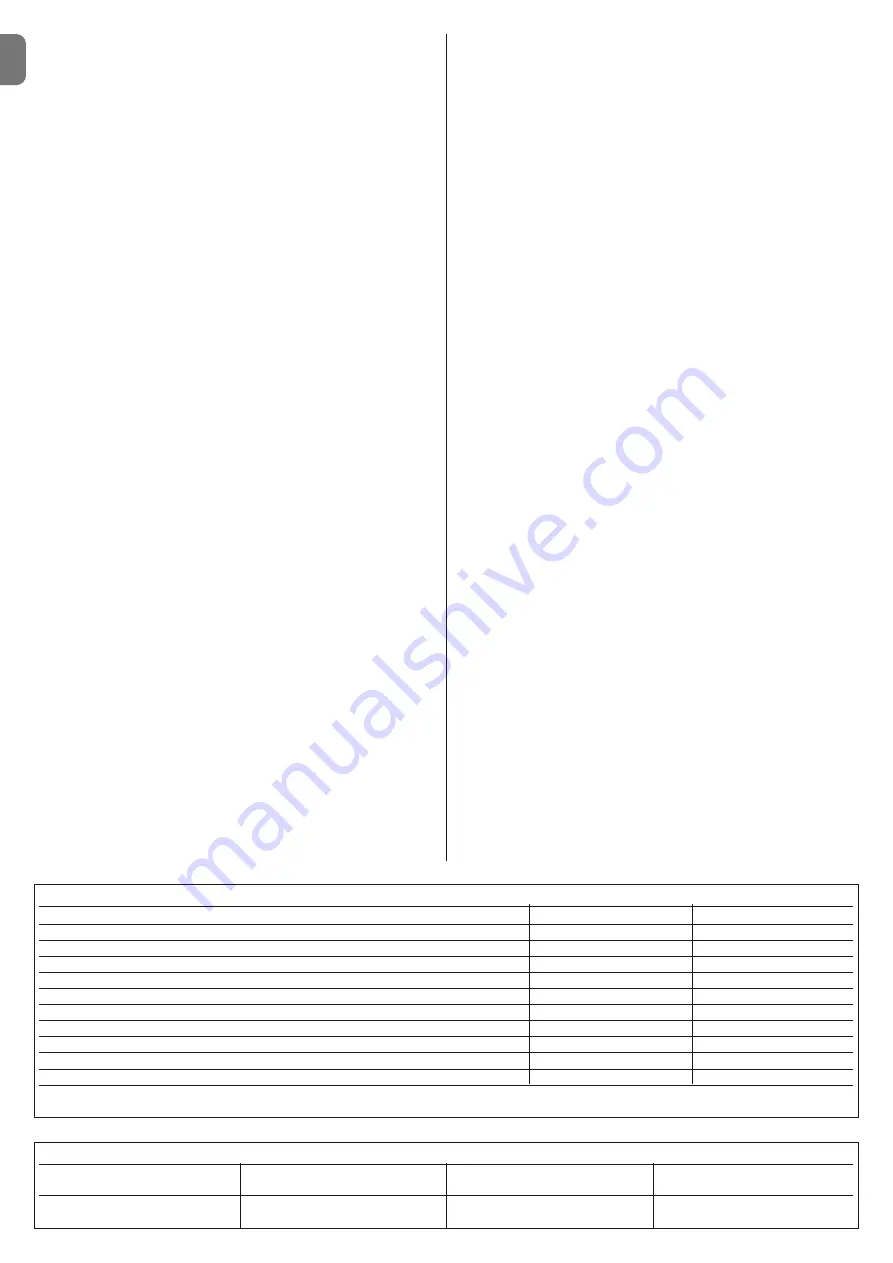
EN
2
– English
- Failure to observe one or more of these criteria during installation or use
may mean that the SBAR product may not meet all the essential require-
ments.
Use of the product in these situations is strictly prohibited until
all the directive requirements are met: the “EC declaration of Conformi-
ty” in appendix I of this manual may not be used.
As a consequence, the
in staller in turn becomes the manufacturer of the “automatic barrier”, and
must therefore observe all requirements of the Machinery Directive
2006/42/EC. The manufacturer must complete a risk assessment, which
also includes the list of essential safety requirements as stated in “appendix I
of the Machinery Directive”, specifying the relative solutions adopted. Note
that the risk assessment is one of the documents that constitutes the au -
tomation “technical documentation”. This must be compiled by a profession-
al installer with the possibility of using the “Declaration of Conformity” in
appendix II to be compiled by the installer of SBAR.
Special warnings regarding suitability of this product in relation to the
“Machinery” Directive 2006/42/EC; to be taken into consideration when the
installer becomes the manufacturer of the product. SBAR is issued onto the
market as a “quasi machine” and therefore constructed for incorporation in
a machine or to be assembled with other machinery to produce a single
“ma chine” in accordance with the Directive 2006/42/EC only in conjunction
with the other components and in the ways as described in this instruction
manual. As established in directive 2006/42/EC, this product may not be
started up until the manufacturer of the machine, in which this product is
incorporated, has not identified and declared as compliant with the direc-
tive 2006/42/EC.
• “Low Voltage” Directive:
Particular warnings concerning the suitable use of this product in relation to
the 2006/95/EEC “Low Voltage” Directive:
This product meets the requirements of the “Low Voltage” Directive if used
as specified in the configurations as envisaged in this instruction manual
and in combination with the articles listed in the product catalogue of Nice
S.p.a.
These requirements may not be guaranteed if the product is used in config-
urations or with other products that have not been foreseen; the use of the
product is prohibited in these situations until the correspondence to the
requirements foreseen by the directive have been verified by those perform-
ing the installation.
• “Electromagnetic compatibility” Directive:
Particular warnings concerning the suitable use of this product in relation to
the 2004/108/EEC “Electromagnetic Compatibility” 2004/10/EEC:
This product has been subjected to tests regarding the electromagnetic com-
patibility in the most critical of use conditions, in the configurations foreseen
in this instructions manual and in combination with articles present in the Nice
S.p.a. product catalogue
The electromagnetic compatibility may not be guaranteed if the product is
used in configurations or with other products that have not been foreseen;
the use of the product is prohibited in these situations until the correspon-
dence to the requirements foreseen by the directive have been verified by
those performing the installation.
1.3.1 - Installation criteria and special warnings related to essen-
tial requirements
This product, if correctly installed, complies with the essential requirements as
envisaged by the European Directive on “Construction Products” 89/106/EEC
according to the provisions of harmonised standard EN 13241-1, as specified
in
Table A
; and by the European Directive on “Machinery” 2006/42/EC.
Caution!
– If SBAR is intended for exclusively vehicle transit, it would be
excluded from the field of application of EN 13241-1; in this case, compliance
with some of the requirements stated in Table A may not be compulsory.
Transit may be considered “exclusively vehicle” when there is an express pro-
hibition for other types (for example pedestrians), such as by using adequate
signs and, if other types are required, there is adequate space in the immedi-
ate vicinity.
• Release of hazardous substances:
The product does not contain and/or release hazardous substances in con-
formity with the provisions of the standard EN 13241-1, point 4.2.9 and ac -
cording to the list of substances stated in the web site of the European Com-
munity *: http:// europa.eu.int/comm/enterprise/construction/internal/dangsub/
dangmain_en.htm
(
*
) Last update: 17/03/2003
Special warning to guarantee compliance with the requirement
– It is
essential that also all other materials used in installation, such as electric cables,
comply with this requirement
• Resistance to wind load:
Table B
specifies resistance of the pole supplied to the differential pressure of
the wind. The tests were performed with the pole fitted with the impact protec-
tion profile; other accessories may increase the exposed surface and thus
reduce the resistance to wind load.
• Safe opening for vertically moving doors:
The product does not cause uncontrolled movements or dropping of the pole in
the event of a fault on a single component of the suspension or balancing
(spring) system.
Special warnings to guarantee compliance with the requirements:
- Perform installation in strict observance of all instructions in chapters “3 -
Installation ” and “5 - Testing and Commissioning”
- Ensure that a maintenance schedule is drawn up (for example, by using a
“Maintenance indicator” connected to the FLASH output associated with the
relative function - see Table 7); in which, all instructions in the chapter “Mainte-
nance Schedule” must be strictly followed.
• Mechanical strength and stability of the product:
The product is designed and constructed to ensure that, during normal use, all
forces applied, impact and normal wear will not damage or impair mechanical
performance.
Caution:
See specifications for the requirement “Safe opening for vertically
moving doors”.
• Manoeuvring forces for power-operated doors/gates:
The operating forces applied by the pole in relation to the risks of crushing and
impact are protected by means of one of the three following methods:
1
For operation with “hold-to-run” controls:
as specified in EN 12453:2000,
point 5.1.1.4. In this case the control button must be located in sight of the
automation, and if accessible by the public, the control must not be available
to the latter, for example protected by means of a key-operated selector
switch.
2
For “semi-automatic” operating mode:
by force limitation as specified in
EN 12453:2000, points 5.1.1.5 and 5.1.3.3.
3
For “automatic” operating mode:
by force limitation as specified in EN
12453:2000, points 5.1.1.5 and 5.1.3; in this case installation is compulsory
of at least one pair of photocells as shown in
fig. 1
.
Specific warnings for “semi-automatic” and “automatic” operating
modes:
the type tests for checking efficiency of force limitation were performed
with the Force setting at the maximum level (Force = 8) and Speed setting at
the maximum value (Speed = 5 (100%); with the pole assembled as per the
instructions and fitted with the “impact protection profile” above and below the
pole and with the accessory “indicator lights” XBA4 inserted on the upper
impact protection profile.
Special warning to guarantee compliance with the requirement:
See spec-
i fications for the requirement “Safe opening for vertically moving doors”.
TABLE A - Essential requirements for CE marking
(according to prospect ZA.1 of standard EN 13241-1)
Essential requirements
Point of standard
Result
Resistance to water
4.4.2
NPD
*
Release of hazardous substances
4.2.9
Compliant
Resistance to wind load
4.4.3
Compliant
Heat resistance
4.4.5
NPD
*
Permeability to air
4.4.6
NPD
*
Safe opening for vertically moving doors
4.2.8
Compliant
Definition of the geometry of glass components
4.2.5
NPD
*
Mechanical strength and stability
4.2.3
Compliant
Manoeuvring forces for power-operated doors/gates
4.3.3
Compliant
Durability of resistance to water, heat resistance and permeability to air
4.4.7
NPD
*
*
NPD = No Performance declared, when the product does not offer this performance, for example “Permeability to air”, or when the requirement is not applicable, such as “Definition
of the geometry of glass components”.
TABLE B
Pole type
Class to EN 12424
Maximum wind speed
Type of phenomena according
to the Beaufort scale
XBA19 pole
5 (> 1000 Pa)
389 m/s (108 km/h)
Storm
Содержание S-BAR
Страница 78: ...I 2 1 A B C B 179 5 mm 330 mm 1146 mm 826 mm 4000 mm 3 b a d e f g h c ...
Страница 79: ...II 5 A B C 1 2 4 ...
Страница 80: ...III 9 10 90 6 A C B 7 8 B A ...
Страница 81: ...IV 14 15 A B A B 11 A B 12 13 A B ...
Страница 82: ...V 16 A B 17 18 ...
Страница 83: ...VI 20 180 21 C C A B 1cm 1cm 19 A C B ...
Страница 84: ...VII 22 23 26 L N 24 1 2 25 ...
Страница 86: ...IX 30 A A B STOP 31 A B ...
Страница 87: ...X 32 A B C D STOP 33 A B 34 ...
Страница 88: ...XI 35 36 L8 37 A B 2 1 L7 L8 L8 A B C Op L5 L6 L7 L8 Stop Set Close F u s e 1 A T 38 ...
Страница 89: ...XII 300 200 700 500 39 300 200 700 500 150 40 41 ...
Страница 90: ...a c d e b XIII F2 F1 42 43 ...
Страница 91: ...XIV 44 O pe n L1 L2 L3 L4 L5 L6 L7 L8 St op Se t Cl os e Fuse 1AT 45 f g ...
Страница 93: ...IST SBARR01 4865_20 10 2011 www niceforyou com Nice SpA Oderzo TV Italia info niceforyou com ...


